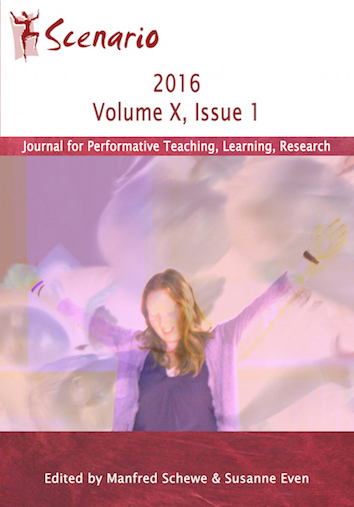Step into Drama and Teach English affordably
DOI:
https://doi.org/10.33178/scenario.10.1.3Abstract
This paper demonstrates how drama was used as a teaching tool in an English as a Foreign Language class in a Greek primary school. This paper presents, in particular, the origins, values and principles of Drama in Education (DiE) while exploring why drama is considered a suitable and efficient learning medium in a country that currently struggles with an economic crisis, which undoubtedly affects the education sector. While Greek schools suffer from staff shortages and limited equipment, there is an urgency for innovative, motivating, and affordable teaching methodologies that activate learners, bridge the gaps left by current teaching approaches, and encourage learners to safely immerse themselves in the target language. Finally, this paper sketches the motivating, engaging, and efficient contribution of DiE to language learning processes and claims it to be an adaptable and affordable teaching medium for any language teacher.1References
Baldwin, Patrice & Hendy, Lesley (1994): The Drama Book: An Active Approach to Learning. London: Collins Educational
Barbu, Lucia (2007): Using Drama techniques for teaching English. http://forum.famouswhy.com/index.php?showtopic=1150 [last accessed June 16, 2015]
Bolton, Gavin (1979): Towards a theory of Drama in Education. London: Longman
Bowell, Pamela & Heap, Brian S. (2013): Planning Process Drama, Enriching Teaching and Learning. Oxon: Routledge
Bräuer, Gerd (ed.) (2002): Body and Language: Intercultural Learning Through Drama. Westport, CT: Ablex Publishing Corporation
Brecht, Bertolt (2010): The Measures Taken, and other Lehrstücke. Berlin: Methuen Publishing
Brennan, Ross (2008): Educational drama: A tool for promoting marketing learning? In: International Journal of Management Education 8/1, 1-9
Dewey, John (1921): The School and Society. Chicago: University of Chicago Press.
Evans, Stephen (1997): Teacher and learner roles in the Hong Kong English language classroom. In: Educational Journal 25/2, 43-62
Freire, Paul (1996): Pedagogy of the Oppressed. London: Penguin
Hayes, Susan K. (1984): Drama as a Second Language. Cambridge: National Extension College Trust
Heathcote, Dorothy & Bolton, Gavin (1995): Drama for Learning: Dorothy Heathcote’s Mantle of the Expert Approach to Education. Portsmouth, NH: Heinemann
Hornby, Albert Sidney (1950): The situational approach in language teaching. A series of three articles in English Language Teaching 4/5, 98-104, 121-128, 150-156
Howatt, Anthony (1984): A history of English language teaching. Oxford: Oxford University Press
International Monetary Fund (IMF), (2011): Greece: Letter of Intent, Memorandum of Economic and Financial Policies, and Technical Memorandum of Understanding. November 30, 2011. http://www.imf.org/external/np/loi/2011/grc/113011.pdf [last accessed June 16, 2015]
Kalogirou, Konstantina (2012): Drama: a vehicle towards creative, interactive and joyful English Language Teaching. M.A. thesis. Goldsmiths College, University of London
Kao, Shin-Mei & O’Neill, Cecily (1998): Words into Worlds. Learning a Second Language Through Process Drama. Westport, CT: Ablex Publishing Corporation
Kim, Le, Su (1995): Creative Games for the Language Class. In: Forum 33/1, 35
Lyrintzis, Christos (2011): Greek Politics in the Era of Economic Crisis: reassessing Causes and Effects. In: Hellenic Observatory Papers on Greece and Southeast Europe 45, 1-24
Maley, Alan & Duff, Alan (1979): Drama Techniques in Language Learning. Cambridge: Cambridge University Press
McDonough, Jo; Shaw Christofer & Masuhara, Hiroshi (2013): Materials and Methods in ELT (3rd ed.). Chichester, West Sussex: Wiley-Blackwell
Neelands, Jonathan (1990): Structuring Drama Work. Cambridge: Cambridge University Press
Neelands, Jonathan (1984): Making Sense of Drama, London: Heinemann.
Newsome, John (1963): Half our Future. London: Ministry of Education, Her Majesty’s Stationery Office
Nguyen, Thi Thanh Huyen and Khuat, Thi Thu Nga (2003): Learning Vocabulary Through Games. In: Asian EFL Journal 5/4. http://www.asian-efl-journal.com/dec_03_vn.pdf [last accessed June 16, 2015]
Nicholson, Helen (2009): Theatre and Education. Basingstoke: Palgrave Macmillan
O’Neill, Cecily (1995): Drama Worlds: A Framework for Process Drama. Portsmouth, NH: Heinemann
Rohrs, Hermann. & Lenhart, Volker (1995): Progressive Education Across the Continents: A Handbook. Berlin: Peter Lang Pub Inc
Richards, Jack & Rodgers, Theodore (2001): Approaches and Methods in Language Teaching. Cambridge: Cambridge University Press
Sotiropoulos, Dimitris, (2001): The politics of education reform in Greece. In: SEESOX (South East European Studies at Oxford), Conference: Whose Crisis: Greece’s Politics, Economics and Society in an Era of Uncertainty. Oxford, United Kingdom May, 2011. Oxford: SEESOX. http://www-old.sant.ox.ac.uk/seesox/pdf/SotiropoulosPaper.pdf [last accessed November 9, 2015]
Soulioti, Evaggelia (2007): Teaching English Language in the Greece during from 1913 to 1967: Case study of Municipality of Ioannina; Methodological, didactic, historical extensions and Comparisons with modern approaches. Ph. D. University of Ioannina
Spolin, Violin (1999): Improvisation for the Theater: A Handbook of Teaching and Directing Techniques. Illinois: Northwest University Press
Tanaka, Takako (2009): Communicative Language Teaching, and its cultural appropriateness in Japan. In: The Literary Association (Doshisha University) 84, 107-123
Tzotse-Lanara, Zoe (2012): The Impact of Anti Crisis Measures and the Social and Employment Situation, Greece. http://www.eesc.europa.eu/resources/docs/qe-31-12-350-en-c.pdf [last accessed October 8, 2015]
Ur, Penny (2012): A course in ELT (2nd ed). Cambridge: Cambridge University Press
Winston, Joe & Tandy, Miles (1998): Beginning Drama 4-11. London: David Fulton Publishers Ltd
Wright, Andrew; Betteridge, David & Buckby, Michael (1984): Games for Language Learning (2nd ed). Cambridge: Cambridge University Press
Wright, Andrew (2005): Games for Language Learning. New York: Cambridge University Press
Published
Issue
Section
License
Copyright (c) 2016 the author(s)

This work is licensed under a Creative Commons Attribution-NonCommercial-NoDerivatives 4.0 International License.







